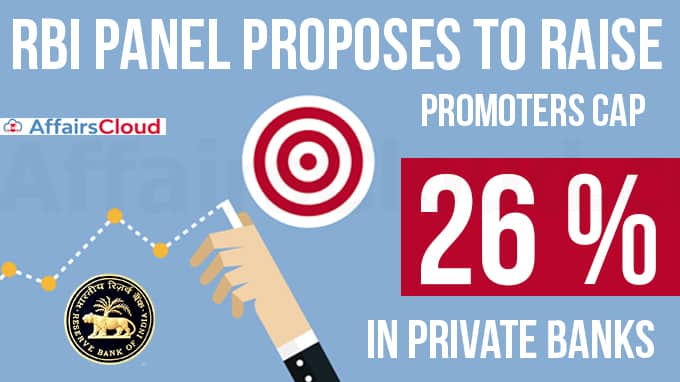
- It also recommended prescribing a uniform cap of 15% of the paid-up voting equity share capital of the bank for all types of shareholders (non-promoter shareholding).
- The RBI has placed the report for comments of stakeholders and public by January 15, 2021.
Other key Recommendations:
–Authorization of large corporate or industrial houses as promoters will be done only after amendments to the Banking Regulation Act, 1949 and strengthening of the supervisory mechanism for conglomerates.
–Large non-banking finance companies (NBFCs) with an asset size of Rs 50,000 crore and above, and completed 10 years of operations can be considered for conversion into banks. The eligible large NBFCs owned by a corporate house can also be considered for the same.
–There should be enhancement in the minimum initial capital requirement for licensing new banks from Rs 500 crore to Rs 1,000 crore for universal banks and from Rs 200 crore to Rs 300 crore for small finance banks.
–A 3 years of experience is sufficient for Payments Banks who want to convert to a Small Finance Bank.
—Non-operative Financial Holding Company (NOFHC) will continue to be the preferred structure for all new licenses to be issued for universal banks.
–Once the NOFHC structure gets a tax-neutral status, all banks licensed before 2013 should attain NOFHC structure within 5 years from announcement of tax-neutrality.
Recent Related News:
i.On August 12, 2020, RBI mandated the urban co-operative banks (UCBs) with assets of Rs 2,000 crore or above as on March 31, 2020 to implement system-based asset classification from 30 June 2021.
ii.In a first-of-its-kind measure, the Reserve Bank of India will buy bonds issued by state governments i.e. state development loans (SDL) in the current financial year (FY21) as a special case via secondary market open market operations(OMO), to ensure they don’t face rising interest costs amid high borrowings.
About Reserve Bank of India (RBI):
Headquarters– Mumbai, Maharashtra
Formation– 1 April 1935
Governor– Shaktikanta Das
Deputy Governors– 4 (Bibhu Prasad Kanungo, Mahesh Kumar Jain, Michael Debabrata Patra, and M Rajeswar Rao)